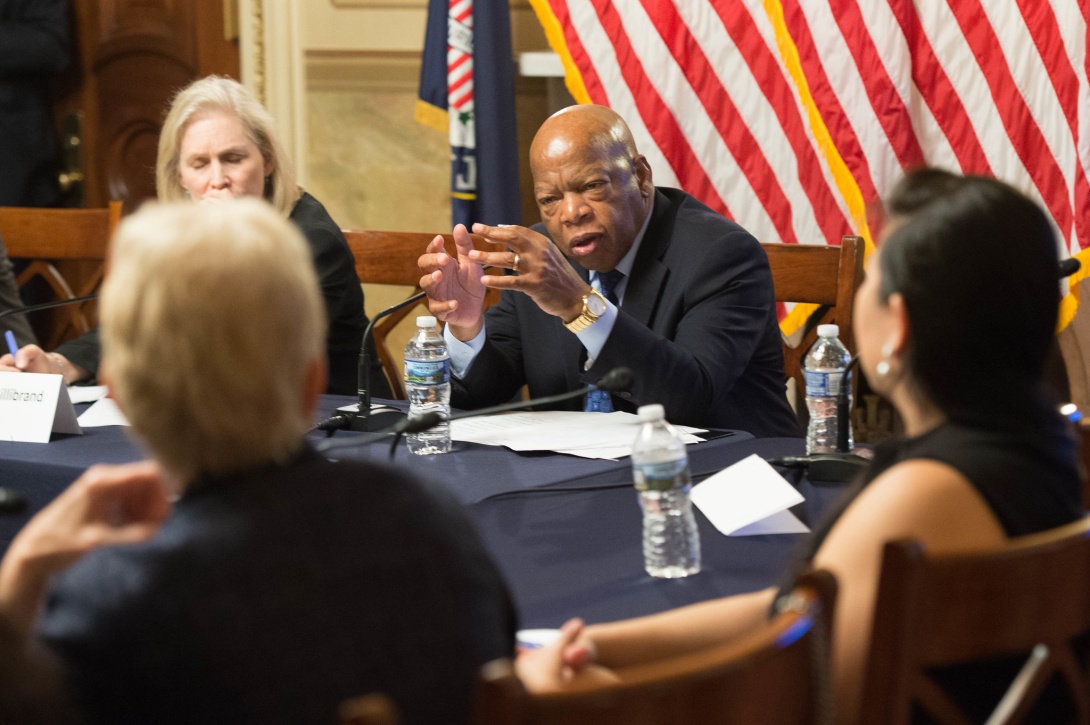John Lewis's final fight to restore the Voting Rights Act

In this 2016 photo, the late Rep. John Lewis (D-Georgia) is seen discussing voting rights at the U.S. Capitol. (Senate Democrats photo via Flickr.)
This past weekend, amidst a gathering of onlookers and mourners, a casket bearing the body of U.S. Rep. John Lewis (D-Georgia) was pulled by a horse-drawn carriage across the Edmund Pettus Bridge in Selma, Alabama. In March 1965, a 25-year-old Lewis, then chair of the Student Nonviolent Coordinating Committee, led hundreds of protesters on a march across that same bridge to draw attention to the need for voting rights for African Americans across the South. They were met by Alabama police, who assaulted the marchers with nightsticks and fractured Lewis's skull.
"When Alabama state troopers beat and bloodied him on the Edmund Pettus Bridge in 1965, could a young John Lewis ever have imagined this day?" tweeted filmmaker Ava DuVernay. "That he'd live to be 80. That he'd be a lawmaker for decades. That his remains would cross the bridge again, this time lined with roses."
The 1965 Selma to Montgomery marches and the horrific beating of protesters that came to be known as "Bloody Sunday" shocked the nation and led to the passage of the Voting Rights Act. Approved by Congress on Aug. 6, 1965, the VRA was one of the landmark achievements of the civil rights movement. It built on the 15th Amendment that granted African Americans the right to vote by establishing a preclearance system requiring states with histories of voter discrimination to get federal approval before implementing new voting laws.
But in 2013, the U.S. Supreme Court ruling in the Shelby County v. Holder case out of Alabama gutted the VRA and effectively ended federal preclearance of state election law changes. The VRA's preclearance requirement affected states in the South disproportionately, and so did ending it: Of the 13 Southern states, 11 adopted restrictive new voting laws in Shelby's wake. They include discriminatory voter ID laws, closures of polling places, gerrymandered districts, and voter roll purges — all of which disproportionately impact Black voters.
Since then, there has been legislation introduced in Congress to restore the gutted sections of the VRA that Lewis championed. But it has been opposed by Republicans, including some of the same GOP leaders who offered praise for Lewis after his passing. For example, during a ceremony at the U.S. Capitol this week, Senate Majority Leader Mitch McConnell of Kentucky called Lewis the "hero our nation needed" — even though he has dismissed rampant voter suppression and blocked existing legislation to restore the VRA.
The irony did not go unnoticed. "Mitch McConnell is praising John Lewis right now but has been blocking a vote on legislation to restore the Voting Rights Act, Lewis' greatest legacy," tweeted voting rights expert Ari Berman.
Now as Lewis lies in state in the U.S. Capitol rotunda, the first Black lawmaker to do so, his colleagues are working to honor him by continuing his fight for voting rights. Recently lawmakers agreed to rename H.R. 4, a House-passed bill that reinstates key components of the VRA, after Lewis. The bill sponsored by Rep. Terri Sewell (D-Alabama) and originally titled the Voting Rights Advancement Act was approved by the House last December. It would establish a new formula for determining which states would need federal preclearance of election changes.
"H.R. 4 would serve as an antidote to the Supreme Court's Shelby ruling, putting the teeth back into the Voting Rights Act of 1965 that Lewis and so many other 'foot soldiers' marched, bled and gave their lives for," Sewell wrote in a recent op-ed calling for the bill's passage.
And last week in the U.S. Senate, Patrick Leahy (D-Vermont) introduced companion legislation titled the John Lewis Voting Rights Advancement Act (S. 4263). The Senate bill currently has has 47 cosponsors, including every Democrat, two independents who caucus with Democrats, and Republican Sen. Lisa Murkowski of Alaska.
"John called voting 'the most powerful nonviolent tool we have to create a more perfect union.' He was right," Leahy said in a press statement. "And that's why we cannot stand idly by while states engage in flagrant suppression schemes to take this tool away from marginalized communities."
The measure has been referred to the Senate Judiciary Committee, which is chaired by Lindsey Graham of South Carolina, who upon Lewis's passing said he "lived a consequential life and worked hard to make America a more perfect Union." Other members of the committee representing Southern states are Marsha Blackburn of Tennessee, John Cornyn and Ted Cruz of Texas, John Kennedy of Louisiana, and Thom Tillis of North Carolina, all Republicans.
"Words are great, but the most meaningful thing that you could do is to put substance to those words," said House Majority Whip Jim Clyburn (D-South Carolina), who proposed the legislation's name change. "So if you love John, want to honor John, let's do something and pass this law. His law."
Tags
Benjamin Barber
Benjamin Barber is the democracy program coordinator at the Institute for Southern Studies.
